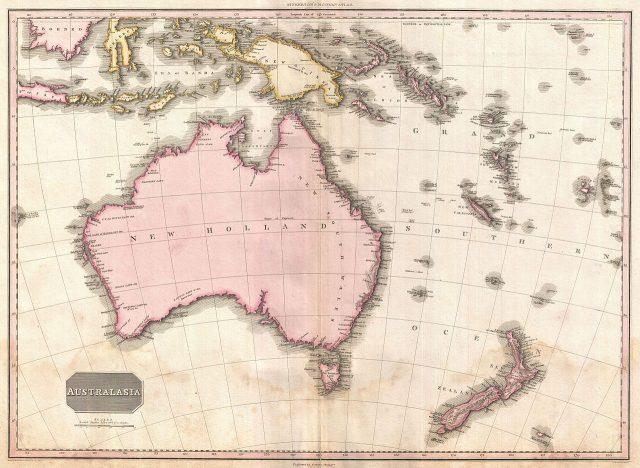
Mark Thomson’s account of Australia–New Zealand defence differences prompts an impolite question: quite what is the point of these trans-Tasman comparisons?
The intellectual answer is that we want an accurate account of the world around us. Australia’s world (at least sometimes) includes New Zealand, whose world (almost always) includes Australia. It’s important to see how we compare, and then to compare our comparisons.
But there should be a policy angle too. Understanding where Australian and New Zealand security policies differ and converge may clarify the future of the trans-Tasman alliance.
Mark seems genuinely taken aback by the differences he has discovered. ‘Given the shared history and common heritage of the two countries’, he argues, ‘it’s not immediately clear why such substantial differences have arisen.’
But there are important dissimilarities in our histories. And as the late Denis McLean (a former New Zealand Secretary of Defence) observed in his fabulously entitled Prickly Pair, these differences are reflected in our separate and rival nationalisms.
Policy-makers on both sides of the Tasman need to be aware of these differences and still find ways to work together. To wit the refreshing insistence in the 2016 Australian Defence White Paper:
‘We recognise that New Zealand will make its own judgements on its national interests, and that New Zealand’s military capability choices may not always reflect Australia’s. Despite this, we will continue to coordinate our efforts with New Zealand in the South Pacific and in supporting our shared interests in a secure region and a rules-based global order.’
But this leads to a third possible reason for comparison making. If the policy gaps between Australia and New Zealand are bigger than they should be, comparisons may pinpoint the areas requiring change to bring us closer.
This almost suggests that collaboration demands equivalence. But Mark implies that New Zealand and Australia really should see the world more similarly than they apparently do:
‘…as maritime trading nations in the same part of the world, interests should be strongly aligned; both countries would be severely affected if trade was disrupted, and the security of each is ultimately contingent on strategic stability in Asia. What’s more, New Zealand can’t be secure if Australia isn’t.’
And now the really interesting question arises. If ways were found to bridge the gaps between Australia and New Zealand, who would do the adjusting? The consensus appears to be that the change should come from New Zealand. As I have argued on Incline, the Turnbull government’s White Paper welcomes New Zealand back to the upper strategic echelons. This point is conveyed in references to New Zealand and Australia as ANZUS allies, which, as Mark notes, didn’t make John Key’s day. Australia’s elevation of New Zealand’s profile is partly due to our cooperation in Iraq, but I expect also because of New Zealand’s accelerating partnership with the United States and willingness to speak out Asia’s maritime tensions including in the South China Sea.
I’ve not found a parallel logic in New Zealand’s briefer and less prescriptive White Paper (whose arrival occasioned my earlier exchange in these pages with Peter Jennings). The Key government doesn’t say very much about what it expects from Australia except perhaps that it will remain sitting about where it is. ‘Through its size, location and strategic reach, Australia contributes significantly to New Zealand’s security’, the New Zealand White Paper announces. And it’s important for New Zealand to try and keep up: ‘it is critical that the Defence Force maintains its ability to operate effectively with its Australian counterpart’. Seemingly Australia does what it does and New Zealand adapts.
You might say that this is how it works between larger and smaller members of an alliance, especially where the latter attaches more importance to the relationship. But this leads to an interesting thought experiment. What if New Zealand was asked about the changes it would like to see Australia make?
I think there might be two main requests. First, when Australia is focused on Middle East operations and maintaining a capability edge in the Indo–Pacific (a regional conception not shared by New Zealand) it should recall the South Pacific’s importance. New Zealand’s White Paper expects its defence force to be involved in a major Pacific operations over the next ten years. They would very likely be conducted with Australia. And Wellington may wonder if Canberra has thought carefully about the suitability of the ADF’s capability trends for Pacific operations. Some of the new stuff looks rather big for local conditions.
The second query involves Australia’s approach to the major regional powers in the Asia–Pacific. Wellington knows Canberra’s concerns about China’s approach to maritime disputes in East Asia. As recent Ministerial comments suggest, Wellington is concerned too. But Mark’s observation that ‘Australia has adopted a cautious position on the Middle Kingdom’s growing assertiveness’, might raise eyebrows in New Zealand. While sharing the Australian White Paper’s view that the rules based system is under challenge, including in Asia, Wellington might welcome its number one ally being more reluctant to portray China as an outlier from that system, and less hasty to set up a contest where only American leadership in Asia can make the difference.
But New Zealand would add a proviso. Whatever you do, Australia, don’t get too close to our approach. Otherwise New Zealand’s independent identity will be submerged by a sea of sameness. That risk may encourage Wellington to keep trans-Tasman differences looking a little bigger than they really are.